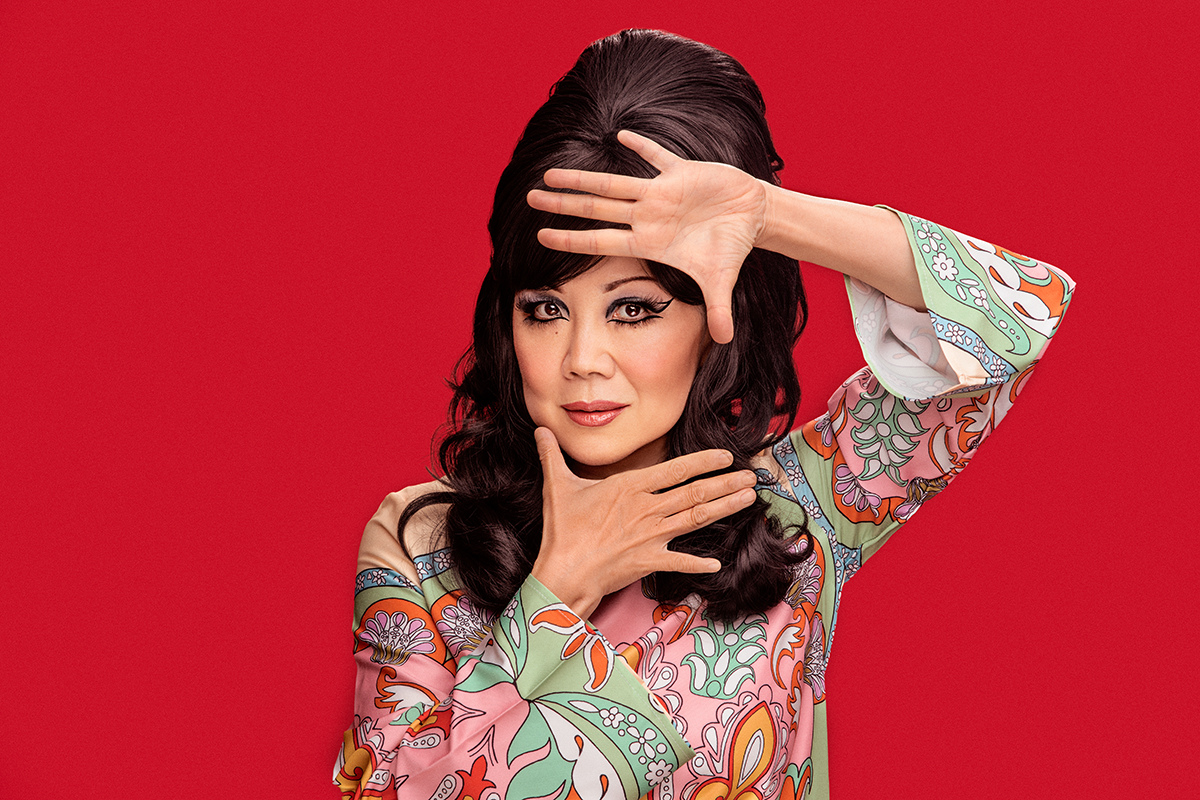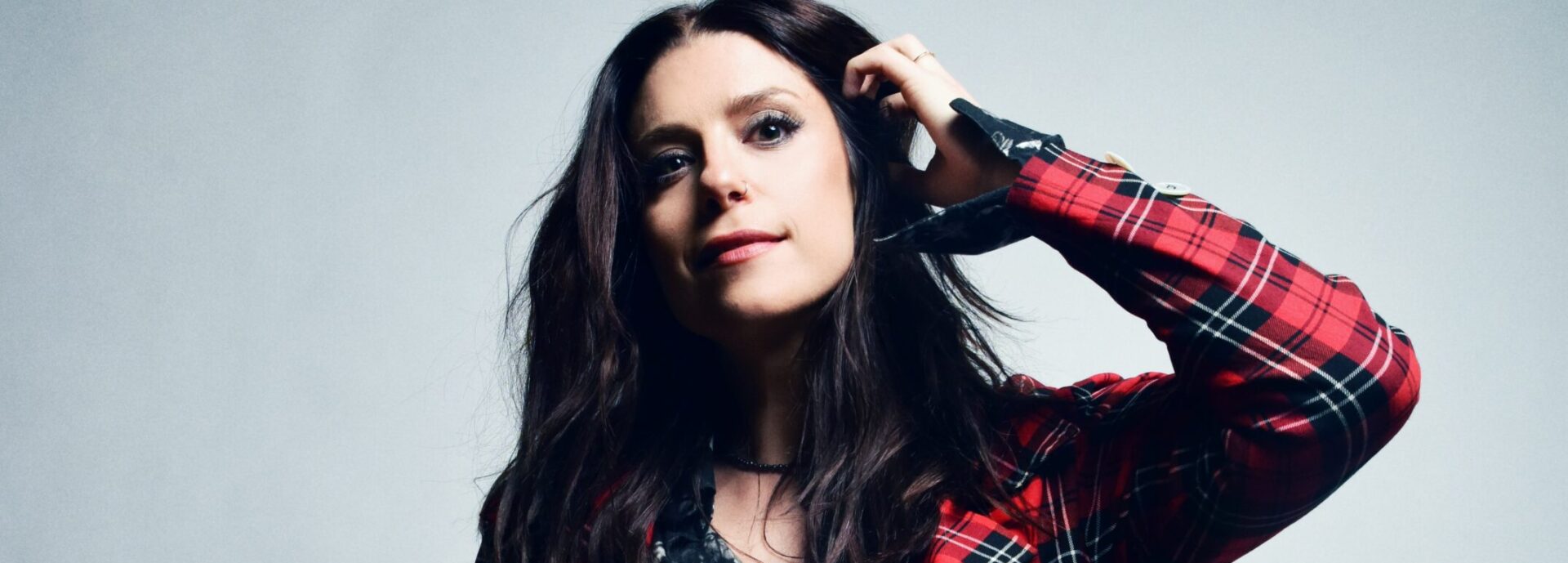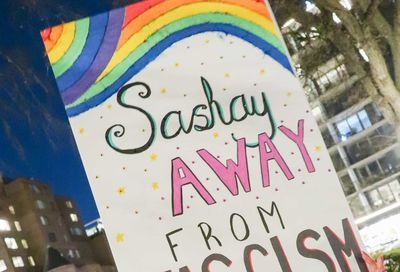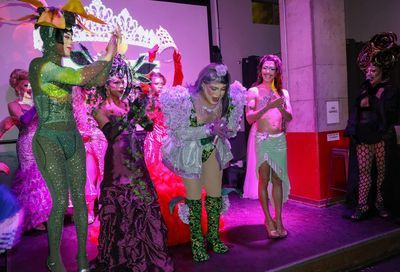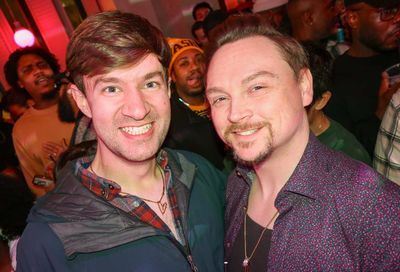For Goodness Sykes
Her sassy, brassy persona made comic Wanda Sykes a hit with gays. Her coming out only sealed the deal.
Wanda Sykes is power-walking.
At least that’s what I think she’s doing. I hear birds chirping in the background, and once during our conversation she exclaims out of nowhere, “Man, that was a big hill.” She sounds slightly — just slightly — winded throughout our hour-long chat.
Nothing like getting a little physical exercise while conversing with a reporter.
Sykes isn’t at all what you’d expect. Her sassy, brassy persona, the aggressiveness that shines through in her stand-up routine, and in her honed-to-perfection comic acting on shows like Larry David’s Curb Your Enthusiasm and The New Adventures of Old Christine, where she more than holds her own opposite star Julia Louis-Dreyfus, is absent. She’s almost eerily polite. You want to say, “Hey Wanda, please, please, verbally abuse me. Trust me, I more than deserve it. So, please…?”

Wanda Sykes
(Photo by Roger Erickson)
But Sykes, who will be shooting an HBO Special of her current stand-up tour next Friday, Aug. 21, and Saturday, Aug. 22, at the Warner Theatre, is in placid mode right now.
Frankly, it’s a fallacy that comics are always on, always funny, that every comment that pours forth from their lips is an uproarious gem. In fact, most comics are fairly ordinary. The funny stuff — to them, that’s work. Fortunately, Wanda Sykes loves her current job.
“There’s nothing like stand-up,” she marvels. “It’s the one thing I do where I really get affirmation that I’m funny. The traveling part can get to you sometimes, but doing stand-up is where I feel the most free.”
Sykes was born in 1964 and raised in nearby Gambrills, Md., in Anne Arundel County. After college, she worked at the National Security Agency as a “contracting specialist,” but longed for something else. She eventually found her path to show business by way of the comedy circuit.
High profile, memorable TV appearances on The Chris Rock Show (for which she also served as a writer) and Curb Your Enthusiasm led Sykes to her own FOX sitcom, Wanda at Large, which ran for 15 episodes in 2003 before the network cast it aside.
“I was happy with Wanda at Large,” says Sykes. “But you’re at the mercy of the network. Wanda at Large was doing great. We were in the Top 20 and then they decided to move us [from Wednesday nights] to Friday nights. It just killed us.”
How did she cope with the cancellation?
“Alcohol,” she deadpans. “Lots of alcohol. I wish I could say, ‘Oh, you get over it.’ But no, it was alcohol.”
Sykes made headlines last November when she spontaneously came out at a Las Vegas rally decrying the passage of Proposition 8, which restricted the definition of marriage in California to opposite-sex couples. Sykes had just married her partner, Alex, in October of 2008.
She made headlines again last May, when she became the first openly GLBT performer to headline the White House Correspondents’ Association Dinner. At the event, Sykes raised more than a few eyebrows when she took aim at Rush Limbaugh, calling the ultra-conservative’s rantings about President Obama treason, and wishing aloud that the radio host’s kidneys fail. She got laughs, sure, but she also got flak the next day from the White House itself. No matter, like everything else in the modern-day whirlwind news cycle, her comments were ancient history in a matter of days.
At around the same time, Sykes and Alex became mothers of twins — a boy and a girl. Sykes is embracing first-time motherhood with a passion.
“It’s kickin’ my ass,” she exclaims. “I’m loving it, but wow! It’s no sleep. You feel a huge responsibility. You’re responsible for every little thing, every little detail about these little babies.”
But the babies — and Alex — have given Sykes fresh material with which to work. It’s the way of the comic: bring your home life to your workplace. In Sykes’ case, however, work is no longer some drab government desk, but a 2,000-seat theater, with her center stage, packed with people laughing their asses off.
All said, not a bad job if you can get it.
METRO WEEKLY: You were born and raised in Maryland, near D.C. Talk about your memories of your early life here. What kind of upbringing did you have?
WANDA SYKES: My father was a colonel in the Army. My mom stayed home with us until I got to about junior high school and then went back to work. She was a bank teller. Very suburban, predominantly white neighborhood, predominantly white high school, a typical suburban lifestyle. Got along well with our neighbors.
MW: You’re known for your brassy, outspoken persona. Were you like that as a kid?
SYKES: Yeah, I was outspoken. But I wasn’t disrespectful or precocious. I just called it as I would see it. That got me in trouble sometimes.
MW: For instance?
SYKES: If I heard my parents talk about how they loaned someone money and if that person came over, I would ask them about that money — especially if they had something new. I’d say, "Wait, don’t you owe my father $50? Aren’t those new shoes? Hey!"
In school, I was outspoken and funny — and it would get me out of trouble, like if my paper was a little late or if I was talking in class. The teachers kind of appreciated my humor, I guess. But I knew where the line was between being disruptive and just trying to make people laugh.
MW: Did you have any awareness in your youth that you might want to pursue stand-up comedy as a career?
SYKES: Well, I didn’t know any comedians. Just what you got to see on TV. I remember watching Moms Mabley and Flip Wilson and Carol Burnett, but I never even thought about it, like, “How can I get there?” I had no idea. When I went to college I didn’t study theater or anything like that because I didn’t think my parents would pay for it. So I studied marketing. It was something easy — and I didn’t have to worry about taking a science lab.
MW: You mention Mabley and Wilson. Both were very revolutionary in their own way, particularly Wilson, who was the first African American to have his own variety show. What influence did they have on you?
SYKES: Moms Mabley was this old lady [with] no teeth. And although she was playing a character, she just felt like someone who was being herself. She was very funny. She reminded me of my great grandmother. As a kid, I was just laughing at her appearance and mannerisms, but as I got older and went back to listen to her material, she really touched on politics and social issues. Some really smart stuff.
MW: And Wilson?
SYKES: A black man with his own show? That was huge. His [drag persona of] Geraldine was funny, and I loved the judge. Here was a black man who was dancing around the fact that he was a black man. He also spoke about what was happening during the times.
MW: You worked for the NSA for a time as a contracting specialist, but then made this seismic career shift, one with a huge set of risks. What was it that sparked the change?
SYKES: I just hit a wall at the NSA. I was turning into that government employee who just shows up. And I stopped caring about the job. I felt like I was wasting time and the government’s money — or I should say, taxpayer money — and I thought, "I can stay here for another 20 years until I retireÂ…." But I just knew there was something else I was supposed to be doing with my life.
I heard about a local talent show. Comedy was a category. I thought, “Okay, I’m just going to write some jokes.” I auditioned to be on the show and got on. And that’s where all this began. I said, "Okay, this is it." I just stayed with it.
MW: What was your initial comedy persona like? How similar was it to the Wanda Sykes we see now?
SYKES: Originally I did an impersonation of what a stand-up comic is — a lot of observational humor, men do this, women do that, that kind of stuff. It was very safe, not personalized at all. There was nothing about my act that would tell you something about me.
MW: How much of your real personality do you bring to your comic persona? How much is fabrication for the sake of humor?
SYKES: Put it this way: It’s me, but it’s my fantasy me where being on TV — or even doing stand-up — gives me permission to say and behave the way I would like to behave. But Wanda, the everyday citizen walking around the street… well, I can’t just walk up to people and tell them where to go and threaten them. That would be very inappropriate. I do share the same point of view with my TVÂ persona [on shows such as Wanda at Large] but I’m not really that crazy. I’m not really that out there. I tend to be a little shy sometimes when it comes to meeting people one on one.
MW: In the ’80s, comedy went through a bland period. Everything turned vanilla and politically correct, or so it seemed. Certain topics became off-limits. Now it seems like the gloves are off — the more inappropriate the humor, the better. And there’s currently no shortage of comics who make us laugh but squirm uncomfortably at the same time. Would you say you helped spearhead that movement?
SYKES: You’re asking if I helped bring inappropriate back into comedy? I’ll take that, yeah. But we always had George Carlins out there. During the ’80s he was still edgy, but I get what you’re talking about. I don’t know if comics who fall into that category — edgy or pushing the envelope — I don’t know if the environment creates that. I think that if you’re that type of comic, you’re going to be that type of comic regardless. If the audience wasn’t ready for those comics, they wouldn’t have been successful and probably would have had a hard time trying to find work. But the audience was ready for it, so that’s why it worked.
MW: Do you ever worry about stepping out of bounds, about doing a joke that’s gone too far?
SYKES: I don’t worry about it. My barometer is that I don’t want to be mean spirited — just to attack someone just for the sake of doing it. If you started it, I have a right to go after you. If you did something, I can go after you. But I want it to be about what you did and not just a personal attack or something.
MW: Which is where Rush Limbaugh comes in. You leveled several vicious — and I would agree in his case completely earned — jokes in his direction at the White House Correspondents’ Dinner. You got some flak from the press for it. Looking back, do you regret having said those things about Limbaugh?
SYKES: Not at all.
MW: Do you feel the resulting flak was justified in any way?
SYKES: I missed the flak because I wasn’t even watching television over the next few days. We’d just got back home and I was focused on the babies. I heard there was a lot of flak. But I wouldn’t change anything. I just know a lot of people were in the room, and they were all laughing, so I think there’s a little hypocrisy there — people covering their ass.
MW: Let’s talk about your coming out, which was fairly recent. When did you first realize you might be gay?
SYKES: Gee, I can go back to as a kid — third or fourth grade. But you go, "This is not what I’m supposed to feel," so you just put that in the box and hope it goes away. It wasn’t until later in life that it just resurfaced. After I got divorced [from my husband], things just started to make sense to me as to who I really was. And I said, "Okay, all right." It’s a process. It takes a while to get comfortable with yourself. It was an epiphany. It was like, "Oh, my God, okay, I get it now."
MW: Any reservations at all?
SYKES: There was fear, especially coming from a family that’s religious and all, you worry about that. What’s that going to be like? And also being in show business, how was that going to affect that? Especially being a stand-up, how was the audience going to take it? So all those things come into consideration. Mainly it’s all fear. And once you get past that and get to the point of saying "You know what? I don’t give a damn. I don’t care what people think. I don’t care what happens. I know that for me to be happy and live a healthy life, this is what I have to do.” That was my process. And fortunately, everything – well, not everything – but most of it has been all positive.
MW: You were married to record producer David Hall for seven years in the ’90s. Was that first marriage a happy one?
SYKES: Early on, yes, it was. I’ll just say it didn’t have anything to do with me being… well, I guess at that time I didn’t know. The failure of that marriage was all about career.
MW: Would you say your current marriage is more supportive regarding to your career?
SYKES: One hundred percent.
MW: What’s the key difference?
SYKES: When my wife met me, she didn’t know who I was. She’s from France. The first time we actually sat down and talked [in public], people were coming up and saying, "Hey, Wanda, I’m a fan" and "Hey, Wanda, can I take a picture?" And she was looking like what the hell is going on? Why are these people coming up to you? And I was with a couple of my friends and they said, "You don’t know what Wanda does?" And she said, "No." So I told her I was a porn star. [Laughs.] And [she laughed so hard] she shot soda out of her mouth. It was pretty funny. When she met me, I was already pretty well-established and I had a career. My first marriage, I was still struggling, so it makes it a little harder when things start to pick up and it was like, "Oh, wow, okay." It’s just hard for your partner to go through that.
MW: Why the decision to come out publicly? It seemed pretty sudden.
SYKES: I was angry about the whole Prop. 8 thing. What gives someone the right to tell another person who they can and can’t marry and why do they care? I was so upset and so pissed off from the vote that I was like, "So you don’t approve of gay marriage?" These people just want us to just go away or stay out of their lives.
I hadn’t planned on doing it that day. I was playing Vegas and Planet Hollywood and I wanted to go to the rally and we found the one in Vegas, and it just happened they asked me to come up and speak. I hadn’t planned anything, so it was pretty spur of the moment.
MW: Any regrets?
SYKES: No regrets at all. None.
MW: Do you think you would have come out if Prop. 8 had not given you the motivation?
SYKES: Honestly? I don’t know. Probably, though. But I think I wanted to do it like an interview on Leno or something. It probably wouldn’t have been as political.
MW: Around the same time there was an interesting plot trajectory on New Adventures of Old Christine that had your character of Barb getting married to Christine, as a way of staying in the country. Were you influential in that plotline or was it just coincidence?
SYKES: Coincidence.
MW: How did you feel about that when they came to you with this plotline? Were your fellow castmembers aware that you were gay?
SYKES: Yeah, they knew, everyone knew, the writers knew. I was a little too sensitive the first time going through it. I was like, “Okay, here we go again, making fun of gay people and now we’re going to make fun of gay marriage.” And then I read the script and said, "This is funny." And I know the people who are behind this show and how supportive they are of me, so I just had to back up a little bit and read it for what it was. Also, it was a good move because we were putting [the subject] out there, and anytime you can get people talking about it, I think it’s a good thing.
MW: How did your parents take your coming out?
SYKES: It’s been rough, but overall I know they love me and we’ll just work that out. We’re working on it.
MW: The minute a celebrity comes out, they’re put into a role model-gay spokesperson position. How do you feel about that?
SYKES: I get that I have a voice and I can bring some issues to the forefront, but my opinions are my opinions. I’m not speaking for everybody so if I say something and you don’t agree with it, it’s just my opinion. I’m not trying to be the voice of the gays of the world. I think we all want the same thing — equality. And if I can use my voice or celebrity to push that along and to start a dialogue, then great.
MW: It’s no secret you love the current president.
SYKES: [Warmly.] Yes.
MW: There’s been a lot of criticism leveled at the Obama administration for not moving quickly enough on gay issues. What’s your take?
SYKES: I think the criticism is justified. However, he has a lot on his plate right now and can’t solve everything [at once]. He hasn’t been in office a year yet. I say just give him some time. Of course, we should be vocal and point out and say, "When is it our turn?" But let’s not be too critical and do anything that moves us backwards.
MW: Do you think he’ll deliver for gays?
SYKES: I think so. I think he’s going to repeal "Don’t Ask, Don’t Tell." I think that will go away. And I believe that we’ll get marriage equality.
MW: If you had to pick one, which would you say is the more important issue to solve right now?
SYKES: I’d say "Don’t Ask, Don’t Tell." But that’s a trick question there, Randy. They both are equally important, but as a nation, if you’re gonna say that gays and lesbians cannot serve in the armed forces openly and protect their country, you’re saying [gays] are not even citizens. Like we don’t even want you in the country. I think if we move forward on that, and it becomes more acceptable, then maybe we’ll get marriage equality after that.
MW: What comics do you find funny?
SYKES: I don’t like to answer those questions because I always miss somebody, always leave somebody out.
MW: Okay, then, what makes you laugh?
SYKES: Physical comedy. Real situations, anything that originates from something real. I find that funny.
MW: I’d like to ask you what advice you’d give to young gays and what advice you’d give to young comics starting out? But why don’t we just lump them together and ask, "What advice would you give to a young gay comic?"
SYKES: [Laughs.] Step one: Move to either New York or San Francisco. And then “Play it straight." How’s that?
Wanda Sykes appears Friday, Aug. 21, and Saturday, Aug. 22, at The Warner Theatre, 13th and E Streets NW. Tickets are $37.50. Call 877-598-8696 or visit www.warnertheatre.com.
Support Metro Weekly’s Journalism
These are challenging times for news organizations. And yet it’s crucial we stay active and provide vital resources and information to both our local readers and the world. So won’t you please take a moment and consider supporting Metro Weekly with a membership? For as little as $5 a month, you can help ensure Metro Weekly magazine and MetroWeekly.com remain free, viable resources as we provide the best, most diverse, culturally-resonant LGBTQ coverage in both the D.C. region and around the world. Memberships come with exclusive perks and discounts, your own personal digital delivery of each week’s magazine (and an archive), access to our Member's Lounge when it launches this fall, and exclusive members-only items like Metro Weekly Membership Mugs and Tote Bags! Check out all our membership levels here and please join us today!




